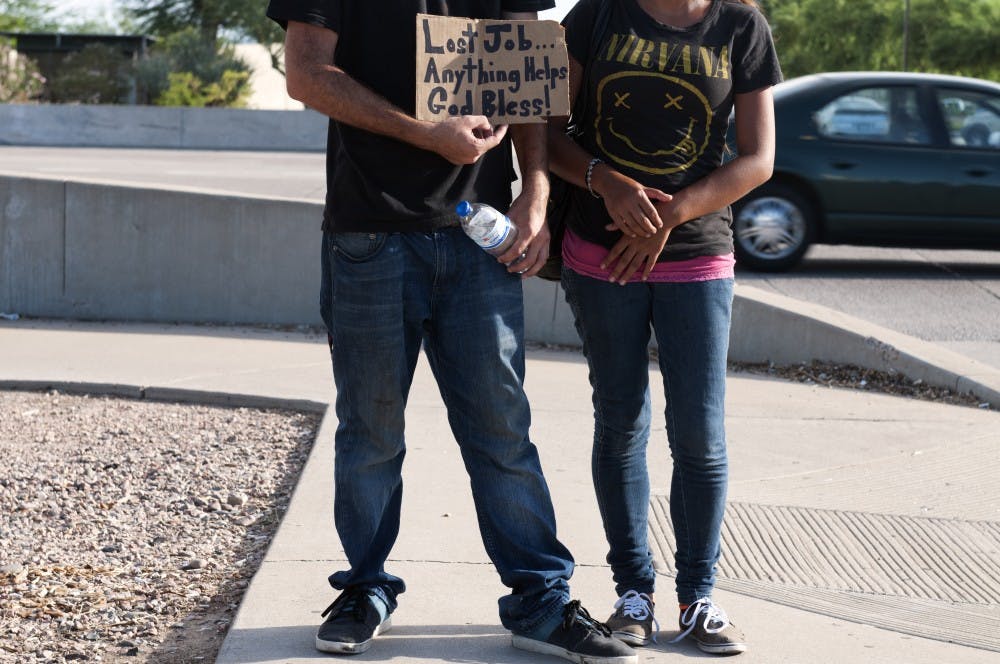 This couple, ages 27 and 23, work as a team, asking for money on the off-ramp of the 101 and Broadway Road to support their four-year-old daughter, after medical bills left the family in a bind. The family turned to panhandling after recently losing their jobs, home and vehicle, but hope it doesn't last long. (Photo by Mario Mendez)
This couple, ages 27 and 23, work as a team, asking for money on the off-ramp of the 101 and Broadway Road to support their four-year-old daughter, after medical bills left the family in a bind. The family turned to panhandling after recently losing their jobs, home and vehicle, but hope it doesn't last long. (Photo by Mario Mendez)Passing between classes, walking to the light rail downtown, or perusing Mill Avenue in Tempe, students almost expect to be approached by strangers and asked for money.
In recent years, Arizona has experienced an increase in the homeless population, which has made the homeless community steadily more visible on streets and other public areas, Phoenix Rescue Mission spokeswoman Nicole Pena said.
Health sciences freshman Arika Janssen said people often approach her asking for money on the downtown Phoenix campus.
“I usually just wait to respond,” she said. “Usually my friends will say something like they don’t have any money. If I’m by myself, I usually just say sorry and that I don’t carry any cash.”
Tourism development sophomore James Corwin said he often gets asked for money while on campus, but said he has never given money to a panhandler.
“Usually I just tell them the truth,” Corwin said. “I usually don’t even have any money, but I will give them water or something if I have that.”
Because ASU is a public campus, there are not any laws in place that prevent people from panhandling on or near campus, ASU police spokesperson Sgt. Daniel Macias said.
A court of appeals recently decided that “loitering to beg” is not illegal, meaning that asking for money while on public property is not a crime. However, there are other possible violations that a person can make while panhandling.
“If a person has been contacted by law enforcement before for trespassing or other things, they can be arrested,” Macias said. “It all depends on if they have been contacted by police before.”
Tempe and other Valley cities have laws that prohibit aggressive panhandling, which can include making physical contact with a person while asking for money, following a person, causing a person to fear bodily harm or damage to property, continuing to solicit after a person has already given a negative response or obstructing a person’s safe passage in the area.
Macias said if students encounter a person who is aggressively panhandling, making them feel unsafe or uncomfortable or harassing them in another manner, they are encouraged to notify campus police.
“In general we do not encourage students to give money to strangers for a number of reasons,” Macias said. “If you reach into a wallet or purse it can divide your attention, and the person can try and take your purse. We also don’t know where the money is going, so if the person has an addiction, the money might be used to feed the addiction.”
Macias said police have noticed that panhandlers tend to gather in places where students have given money before, so by giving money to a stranger, students can encourage the person to keep asking, or more people to gather there and ask for money.
“By handing out money, you aren’t necessarily helping out,” Macias said.
Instead of handing out money, police encourage students who want to give to donate to a charitable organization or volunteer their time in ways that can help the homeless in a more effective way.
“In general our mantra is help out, don’t hand out,” Macias said.
Reach the reporter at cvanek@asu.edu or follow her on Twitter @corinavanek




